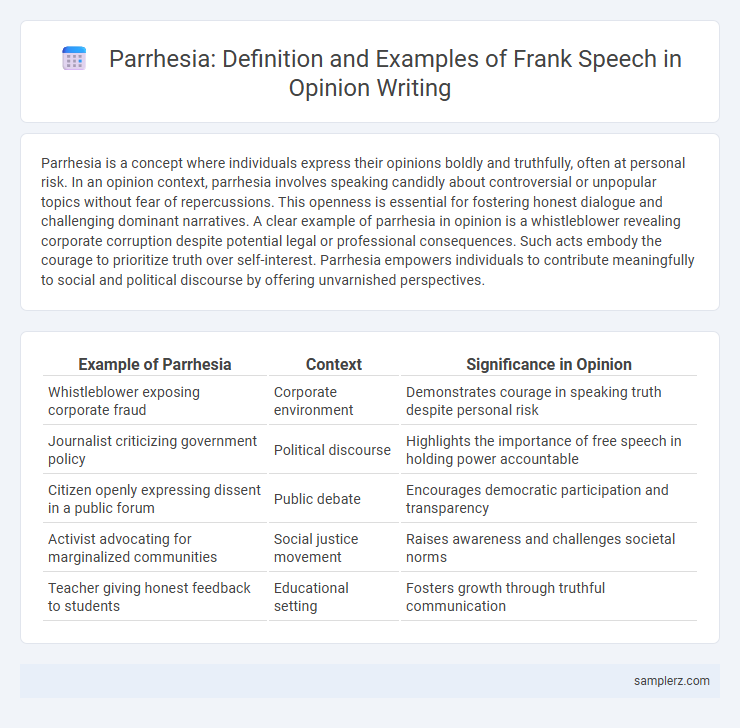Parrhesia is a concept where individuals express their opinions boldly and truthfully, often at personal risk. In an opinion context, parrhesia involves speaking candidly about controversial or unpopular topics without fear of repercussions. This openness is essential for fostering honest dialogue and challenging dominant narratives. A clear example of parrhesia in opinion is a whistleblower revealing corporate corruption despite potential legal or professional consequences. Such acts embody the courage to prioritize truth over self-interest. Parrhesia empowers individuals to contribute meaningfully to social and political discourse by offering unvarnished perspectives.
Table of Comparison
| Example of Parrhesia | Context | Significance in Opinion |
|---|---|---|
| Whistleblower exposing corporate fraud | Corporate environment | Demonstrates courage in speaking truth despite personal risk |
| Journalist criticizing government policy | Political discourse | Highlights the importance of free speech in holding power accountable |
| Citizen openly expressing dissent in a public forum | Public debate | Encourages democratic participation and transparency |
| Activist advocating for marginalized communities | Social justice movement | Raises awareness and challenges societal norms |
| Teacher giving honest feedback to students | Educational setting | Fosters growth through truthful communication |
Defining Parrhesia: The Art of Fearless Opinion
Parrhesia embodies the fearless act of speaking one's truthful opinion openly, even at personal risk, highlighting a commitment to honesty and moral courage. This practice challenges societal norms by prioritizing authenticity over conformity, fostering critical discourse and personal integrity. Examples of parrhesia in opinion reveal its power to inspire change by confronting power structures and encouraging transparent communication.
Historical Examples of Parrhesia in Public Discourse
Socrates' trial in ancient Athens exemplifies parrhesia, where he openly challenged prevailing norms despite facing death. During the French Revolution, figures like Robespierre used parrhesia to confront corruption and demand radical change. More recently, whistleblowers such as Edward Snowden embody parrhesia by revealing government secrecy to the public despite personal risk.
Modern-Day Parrhesia: Speaking Truth to Power
Modern-day parrhesia exemplifies courage in speaking truth to power by openly challenging political leaders, corporate executives, or social norms despite potential risks to personal safety or reputation. Whistleblowers like Edward Snowden highlight the ethical imperative of parrhesia, exposing government surveillance to inform the public and trigger accountability. This fearless expression strengthens democratic discourse and urges transparency in modern governance.
Parrhesia in Journalism: Opinion Pieces That Challenge the Status Quo
Parrhesia in journalism is embodied in opinion pieces that courageously challenge the status quo by speaking truth to power despite potential backlash. Such articles expose systemic injustices and provoke critical public discourse, fostering accountability and social change. Journalists employing parrhesia prioritize honesty and moral responsibility over personal or professional safety to illuminate uncomfortable truths.
Social Media and Parrhesia: Voices That Dare to Disagree
Social media platforms provide a modern arena for parrhesia, where individuals candidly express dissenting opinions despite potential backlash. These digital spaces empower marginalized voices to challenge dominant narratives and reveal uncomfortable truths, embodying the fearless truth-telling characteristic of parrhesia. The risk of social ostracism or online harassment underscores the bravery required to speak authentically and disrupt consensus within virtual communities.
Parrhesiastic Moments in Political Opinion
Parrhesiastic moments in political opinion occur when individuals openly express candid truths despite potential risks, embodying fearless speech as a form of democratic engagement. These instances reveal the crucial role of honesty and courage in political discourse, often challenging power structures and fostering accountability. Such expressions exemplify the essence of parrhesia, emphasizing the ethical responsibility of speaking truth to power in shaping inclusive political narratives.
The Risks and Rewards of Practicing Parrhesia in Opinion Writing
Practicing parrhesia in opinion writing involves candidly expressing controversial truths despite potential backlash, exposing writers to risks such as social ostracism, professional repercussions, or public criticism. However, the rewards include fostering authentic dialogue, challenging prevailing narratives, and empowering both writers and readers to confront uncomfortable realities. Balancing these risks and rewards is essential for sustaining courage and integrity in opinion journalism, where unfiltered truth can drive societal progress.
Parrhesia and the Ethics of Honest Critique
Parrhesia embodies the ethical imperative to speak truth candidly despite potential risks, fostering authenticity in honest critique. This directness challenges complacency and promotes intellectual integrity by valuing transparency over convenience. Ethical parrhesia demands courage, responsibility, and respect, ensuring critiques remain constructive rather than destructive.
Parrhesia in Activism: Courageous Opinions That Spark Change
Parrhesia in activism embodies the fearless expression of truth, where activists boldly challenge oppressive systems despite potential risks. This courageous candor often ignites social movements by exposing injustices and mobilizing collective action. Historical examples include whistleblowers and protest leaders whose unyielding honesty catalyzed significant societal reforms.
Learning Parrhesia: How to Practice Bold Opinion in Today’s World
Learning parrhesia involves embracing courageous truth-telling despite potential social or professional risks, which fosters authentic communication in today's polarized environment. Practicing bold opinion requires cultivating intellectual honesty and awareness of power dynamics to challenge prevailing norms effectively. This approach strengthens democratic discourse by promoting accountability and encouraging open dialogue across diverse perspectives.

example of parrhesia in opinion Infographic
 samplerz.com
samplerz.com